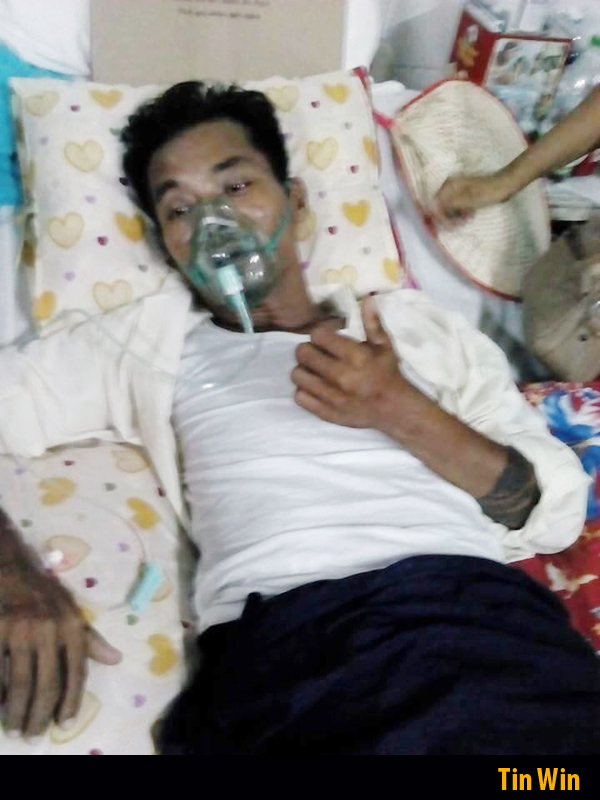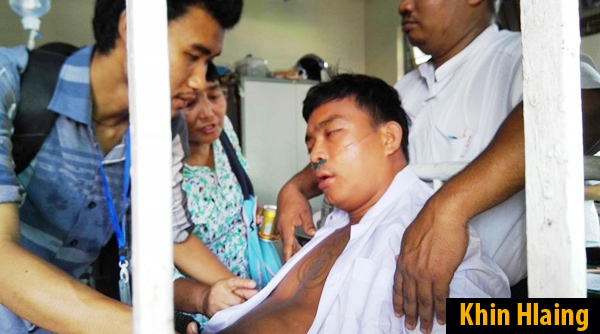BURMA/MYANMAR: Detained Student Protestors in Immediate Need of Medical Attention and Hygienic Environment
Poor and unhygienic conditions in Tharawaddy Prison has resulted in students and their supporters detained there for over 3 months to be afflicted by diseases and ailments. During the brutal crackdown on 10 May 2015, students and their supporters protesting against the National Education Bill were injured, but no medical treatment has been provided to them since the attack and their subsequent arrest. Matters have only gotten worse during the period of their detention.
Unsanitary water, insufficient space, and a lack of access to health care in Tharawaddy Prison have resulted in poor health. Many of the detainees are now suffering from skin infections due to the poor living conditions and most of them bear visible marks of being bitten by insects. The Prison Hospital has not met their needs. And, their prison cells do not even have sufficient light and air. In sum, conditions are inhumane.
 On 2 June 2015, Ko Tin Win, supporter of the student protesters, collapsed, in court prior to his hearing. He had intense breathing difficulties. Ko Tin Win had been brutally beaten up by the police. This violence had caused neck and rib injuries and also nerve damage. He was sent to the Tharawaddy Hospital from the court. However, the hospital transferred him to Yangon General Hospital (YGH) finding his case to be serious and in need of an operation. He is now in Neuro-Surgical Department of YGH following surgery.
On 2 June 2015, Ko Tin Win, supporter of the student protesters, collapsed, in court prior to his hearing. He had intense breathing difficulties. Ko Tin Win had been brutally beaten up by the police. This violence had caused neck and rib injuries and also nerve damage. He was sent to the Tharawaddy Hospital from the court. However, the hospital transferred him to Yangon General Hospital (YGH) finding his case to be serious and in need of an operation. He is now in Neuro-Surgical Department of YGH following surgery.
Another supporter, Ko Khin Hlaing, is frequently falling unconscious and coughing up blood in prison. On 9 June, on the day of his hearing, he vomited blood on the way to court, and thereby couldn’t attend the hearing. The situation was dire; he was sent to Tharawaddy Hospital. But, again, the facilities there were found to be inadequate and he was also transferred to the Neuro-Surgical Department, YGH.
Nanna Sit Aung, one of the detained student leaders, confided the following to a representative of the Asian Human Rights Commission: “the signs of inner wounds that we have been suffering for over 3 months have emerged. We can’t access proper medical assistance and were told to get help from Prison Hospital. However, it provides only for seasonal illness. Ko Khin Hlaing coughing and vomiting blood shows he has suffering from internal disease. We can’t say how many more of us will be like the two now in Hospital.”
The background to the detention of these students and their supporters is opposition to the newly enacted national education law. More than 100 of students and their supporters who were involved in a non-violent protest against the provisions of this law, were subject to police violence and arrested in the second week of March 2015. Some were released without charge and some are on bail, but still nearly 70 are still in prison. Their right to legal assistance has also been denied for weeks (AHRC-STM-045); lawyers have been allowed to support them only on the first day of their respective trails.
 The Asian Human Rights Commission is greatly concerned about the condition of the prisoners. In Burma prisoners do not have access to adequate healthcare or basic hygienic conditions. Therefore, the AHRC urges the government to immediately organize a medical check-up so preventable diseases amongst the detainees can be addressed. Furthermore, the Asian Human Rights Commission urges the government of Burma to send an integrated team comprised of the International Committee of the Red Cross, Rule of Law Committee, and Myanmar National Human Rights Commission to examine the Tharawaddy Prison, the living condition of the inmates, and access to health facilities, so as to guarantee basic conditions to detainees. The international community must pressure the government of Burma to fulfil its responsibilities.
The Asian Human Rights Commission is greatly concerned about the condition of the prisoners. In Burma prisoners do not have access to adequate healthcare or basic hygienic conditions. Therefore, the AHRC urges the government to immediately organize a medical check-up so preventable diseases amongst the detainees can be addressed. Furthermore, the Asian Human Rights Commission urges the government of Burma to send an integrated team comprised of the International Committee of the Red Cross, Rule of Law Committee, and Myanmar National Human Rights Commission to examine the Tharawaddy Prison, the living condition of the inmates, and access to health facilities, so as to guarantee basic conditions to detainees. The international community must pressure the government of Burma to fulfil its responsibilities.



